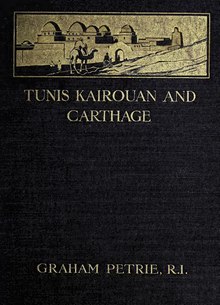Graham Petrie (artist)
Graham Petrie (1859–1940), was a British artist, poster designer, and author.[1][2][3] He was well known for his landscape and travel posters for railway companies.[4]

He was a member of the Royal Institute of Painters in Water Colours (elected 1903) and the Royal Institute of Oil Painters (elected 1920).[1]
He was born in St Pancras, London, his parents were Alexander Sturrock Petrie (1815-1872),[5] merchant, and Elizabeth Cochran. He originally trained as an architect under Richard Phené Spiers, educated at Mill Hill, then studied painting in London under Professor Fred Brown and in Paris. He was the brother of the watercolour landscape painter Elisabeth Cochran Petrie (1847-1921), who exhibited 1880–1902;[1] another sister, Mary Petrie (1851-1934), was also a watercolour artist.[6] Both sisters died at his house, 1 Mallord Street, Chelsea, where he had lived since about 1914.[7][8][9][10]
He exhibited at the Grosvenor Gallery in 1889,[11] with the Royal Society of British Artists in 1890,[12] the Fine Art Society in 1897,[13] the Royal Institute of Painters in Water Colours[14] and with the British Society of Poster Designers in 1927.[15] Also at the Dowdeswell Galleries, New Gallery, and the New English Art Club. He exhibited at the Royal Academy Summer Exhibition between 1893 and 1930.[10]
In 1889 Petrie was present at the dinner held to congratulate Whistler on being made an Honorary Member of the Royal Academy of Munich, at the Criterion in Piccadilly.[2] In 1928 he represented the Chelsea Arts Club on the Chelsea Society Council.[16]

He died on 31 May 1940 at his house in Mallord Street by accidentally setting his bedclothes on fire from a cigarette.[17][18] His body was cremated and the ashes were interred in the Petrie family vault (plot no.25214) on the eastern side of Highgate Cemetery.
Publications
[edit]Tunis, Kairouan & Carthage, described and illustrated with forty-eight paintings, by Graham Petrie, R. I. London, W. Heinemann, 1908.[19]
References
[edit]- ^ a b c "GRAHAM PETRIE". Cornwall Artists Index.
- ^ a b "Graham Petrie, 1859-1940". The Correspondence of James McNeill Whistler.
- ^ "Mr Graham Petrie". Times. 4 June 1940. p. 9 – via The Times Digital Archive.
- ^ "Railway Posters". Times. 20 June 1924. p. 12.
- ^ "Deaths". Morning Post. 10 December 1872. p. 8.
- ^ England and Wales Census, 1881, p. 43, Piece/Folio 187/95, The National Archives, Kew, Surrey
- ^ "Deaths". Times. 3 February 1921. p. 1 – via The Times Digital Archive.
- ^ "Death". Times. 15 March 1934. p. 1 – via The Times Digital Archive.
- ^ Probate Search, https://probatesearch.service.gov.uk/
- ^ a b "Exhibition catalogues". Royal Academy of Arts.
- ^ "GROSVENOR GALLERY". Morning Post. 15 October 1889 – via British Library Newspapers.
- ^ "OUR LONDON CORRESPONDENCE". Glasgow Herald. 1 November 1890 – via British Library Newspapers.
- ^ "The World of Art". Glasgow Herald. 12 April 1897 – via British Library Newspapers.
- ^ "The Royal Institute". Times. 20 March 1906. p. 2.
- ^ "Poster Designs". Derby Daily Telegraph. 5 August 1927 – via British Library Newspapers.
- ^ "Members of the Council of The Society as at the first AGM on 16th May 1928" (PDF). The Chelsea Society.
- ^ "SMOKED IN BED". Chelsea News and General Advertiser. 7 June 1940. p. 1.
- ^ "FATAL SMOKING IN BED 81-YEAR-OLD ARTIST'S DEATH". West London Observer. 7 June 1940. p. 1.
- ^ Tunis, Kairouan & Carthage. 1908 – via HathiTrust Digital Library Bibliography.
